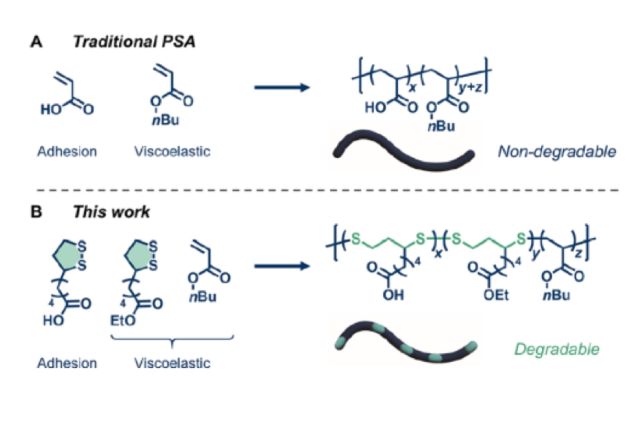Building Tunable Degradation into High-Performance Poly(acrylate) Pressure-Sensitive Adhesives
Successful development of degradable pressure-sensitive adhesives (PSAs) based on poly(acrylate) chemistry.

PIs and Institution
Kaitlin Albanese, Parker Morris, Craig Hawker, Javier Read de Alaniz, and Christopher Bates, UC Santa Barbara
Achievement
In this paper the authors present the successful development of degradable pressure-sensitive adhesives (PSAs) based on poly(acrylate) chemistry. This accomplishment is made possible through a novel approach using α-lipoic acid and ethyl lipoate, as substitutes for traditional acrylate comonomers. These compounds enable the creation of high-molecular-weight copolymers with adjustable levels of degradable disulfide bonds in the polymer backbone. Despite their degradability, these PSAs maintain thermal and viscoelastic properties comparable to nondegradable counterparts. Additionally, their tunable degradability offers versatility, and the materials have the potential for closed-loop recycling due to the ability to undergo oxidative re-polymerization and reductive re-degradation. This achievement addresses sustainability concerns in the adhesive industry and offers a promising solution for recycling and environmental impact reduction.
Importance of the Achievement
PSAs constitute a category of adhesives applied onto flexible substrates, yielding products like labels, tapes (including duct and Scotch tape), and Post-it Notes. Their distinctive trait is the ability to adhere and detach without leaving residue behind. Typically, PSAs are founded on poly(acrylate) chemistry, and face a significant sustainability challenge stemming from their non-degradable backbone. Transforming otherwise persistent poly(acrylates) into recyclable materials using simple and versatile chemistry could play a pivotal role in improving the sustainability of contemporary adhesives. Moreover, these results can further impact other areas of materials science where sustainability is crucial and poly(acrylates) are prevalent, for example, structural adhesives, sealants, and plastics.
Synergies with BioPACIFIC MIP
This project is an integral component of our in-house core initiatives, specifically targeting the utilization of lipoic acid products as a sustainable source of degradable building blocks. Moreover the use of BioPACIFIC MIPs texture analyzer was crucial for the determination of the materials’ mechanical properties and Parker Morris was supported as a BioPACIFIC MIP fellow to conduct the research.